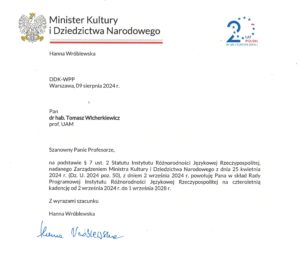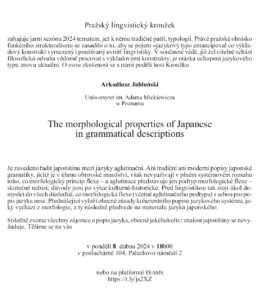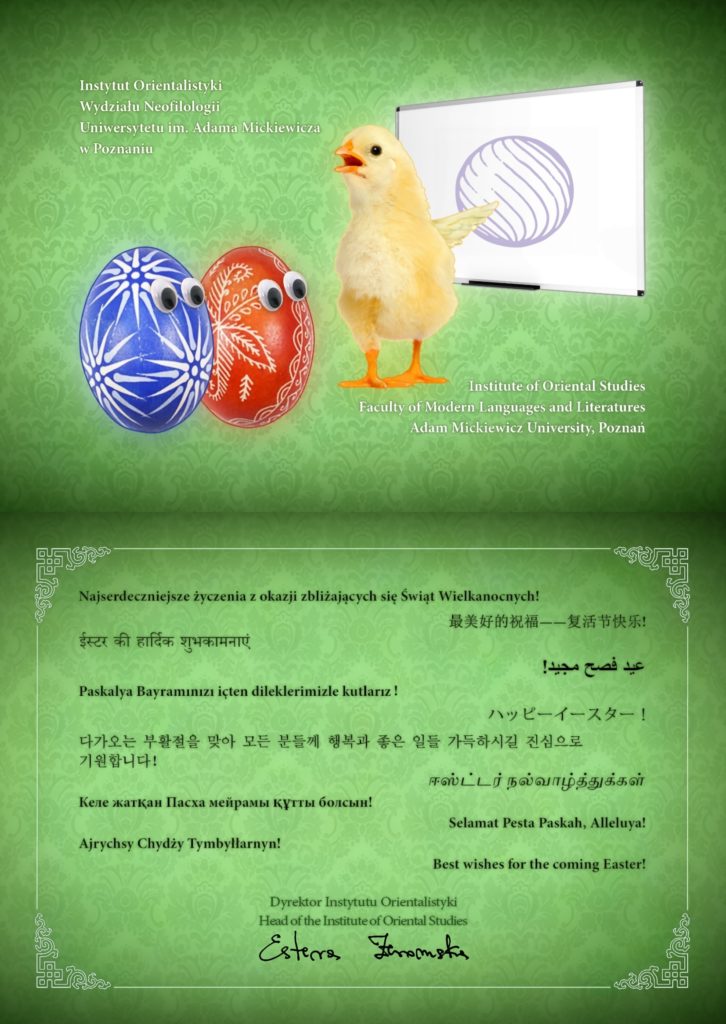

Serdecznie zapraszamy do lektury pierwszego numeru Gazetki Orientalistycznej „Przystanek Kiku” będącej wynikiem współpracy między Kołami i studentami naszego Instytutu. Poruszyliśmy tematy inkluzywności w języku chińskim, teatru Takarazuka Revue, japońskich yōkai kitsune oraz podsumowaliśmy Konferencję Porta Orientalis. Wydanie obejmuje również interpretację baśni tuwańskiej.
Zachęcamy do odwiedzenia naszej strony internetowej.
Ukazało się trzecie wydanie Biuletynu Naukowego Koła Sinologów Zhongguo (众果). Zostało ono w całości opracowane przez studentów Zakładu Sinologii Uniwersytetu im. Adama Mickiewicza w Poznaniu w trakcie roku akademickiego 2023/2024, pod merytorycznym nadzorem i korektą opiekunki koła dr Marii Kurpaskiej. Autorzy tekstów są aktywnymi członkami Koła angażującymi się w działalność kulturalną oraz naukową. Niniejszy biuletyn prezentuje trzy artykuły poświęcone różnym zagadnieniom powiązanym z kulturą, językiem, a także gospodarką Chin.
Nakładem wydawnictwa FNCE ukazała się monografia Dr Marcina Styszyńskiego Priorytety polityki zagranicznej Królestwa Arabii Saudyjskiej w latach 2011-2023, która odsłania kulisy polityki zagranicznej dynastii saudyjskiej związanej początkowo z rywalizacją polityczną, militarną i gospodarczą w Iranem, .a następnie z łagodzeniem napięć z sąsiadami oraz wdrażaniem polityki otwartości kulturowej i obyczajowej. Niektóre wątki odnoszą się również do bieżących wydarzeń związanych z konfliktem izraelsko-palestyńskim i ukazują proces kształtowania się nowego porządku na Bliskim Wschodzie. Książka jest częścią serii wydawniczej w ramach projektu „Gra mocarstw na Bliskim Wschodzie” koordynowanego przez Prof. dr hab. Radosława Fiedlera z UAM.
https://www.fnce.info/portoflio/priorytety-polityki-zagranicznej-krolestwa-arabii-saudyjskiej/

Decyzją Ministry Kultury i Dziedzictwa Narodowego Hanny Wróblewskiej prof. UAM dr hab. Tomasz Wicherkiewicz został powołany w skład rady programowej pierwszej kadencji utworzonego trzy miesiące temu INSTYTUTU RÓŻNORODNOŚCI JĘZYKOWEJ RZECZYPOSPOLITEJ

Z przyjemnością informujemy, że w wydawnictwie Rys ukazała się nowa książka Katarzyny Wizły-Lin z Zakładu Sinologii pt. Różnorodność językowa wyspy Hajnan.
Pozycja jest do pobrania ze strony wydawnictwa na zasadzie tzw. otwartego dostępu. (zalecana się pobranie pliku na komputer, w zależności od urządzeń mobilnych opcja może nie być dostępna)
8 kwietnia o godz. 18:00
w Praskim Kole Lingwistycznym (Pražský lingvistický kroužek) wykład pt. „The Morphological Properties of Japanese in Grammatical Descriptions” wygłosi prof. dr hab. Arkadiusz Jabłoński (miejsce wykładu oraz szczegóły transmisji zdalnej na MS Teams – na plakacie)

